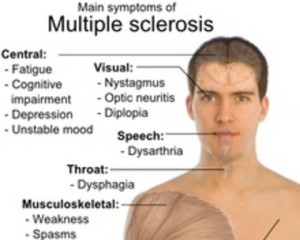Researchers at Weill Cornell Medical College in New York have, according to JoNel Aleccia of NBC News, discovered that a toxin made by the bacterium Clostridium perfringens — responsible for a million cases of food poisoning in the U.S. each year — appears to attack the cells associated with MS.
“What we’ve shown is the toxins target the cells that are targeted in MS,” said Jennifer Linden, a Weill Cornell researcher who’s presenting findings Tuesday at a meeting of the  American Society for Microbiology.
American Society for Microbiology.
Her research also showed that about 13 percent of a small sample of food products harbored C. perfringens bacteria, and nearly 3 percent were positive for the toxin linked to MS.
It’s too early to suggest that MS is caused by food poisoning, but it does raise the possibility that the C. perfringens bacteria could be involved in activating the disease, said Bruce F. Bebo, associate vice president of discovery research for the National Multiple Sclerosis Society.
